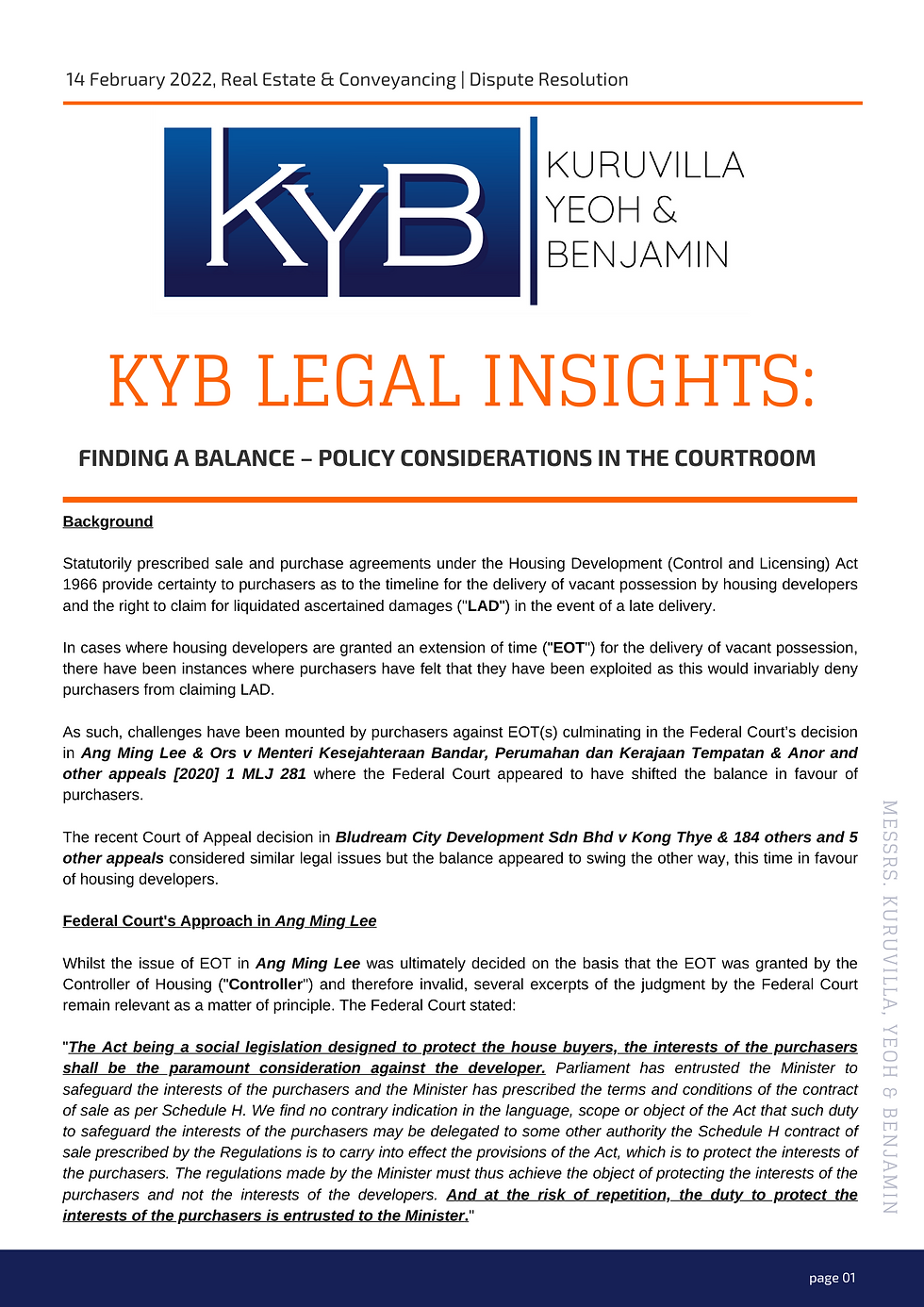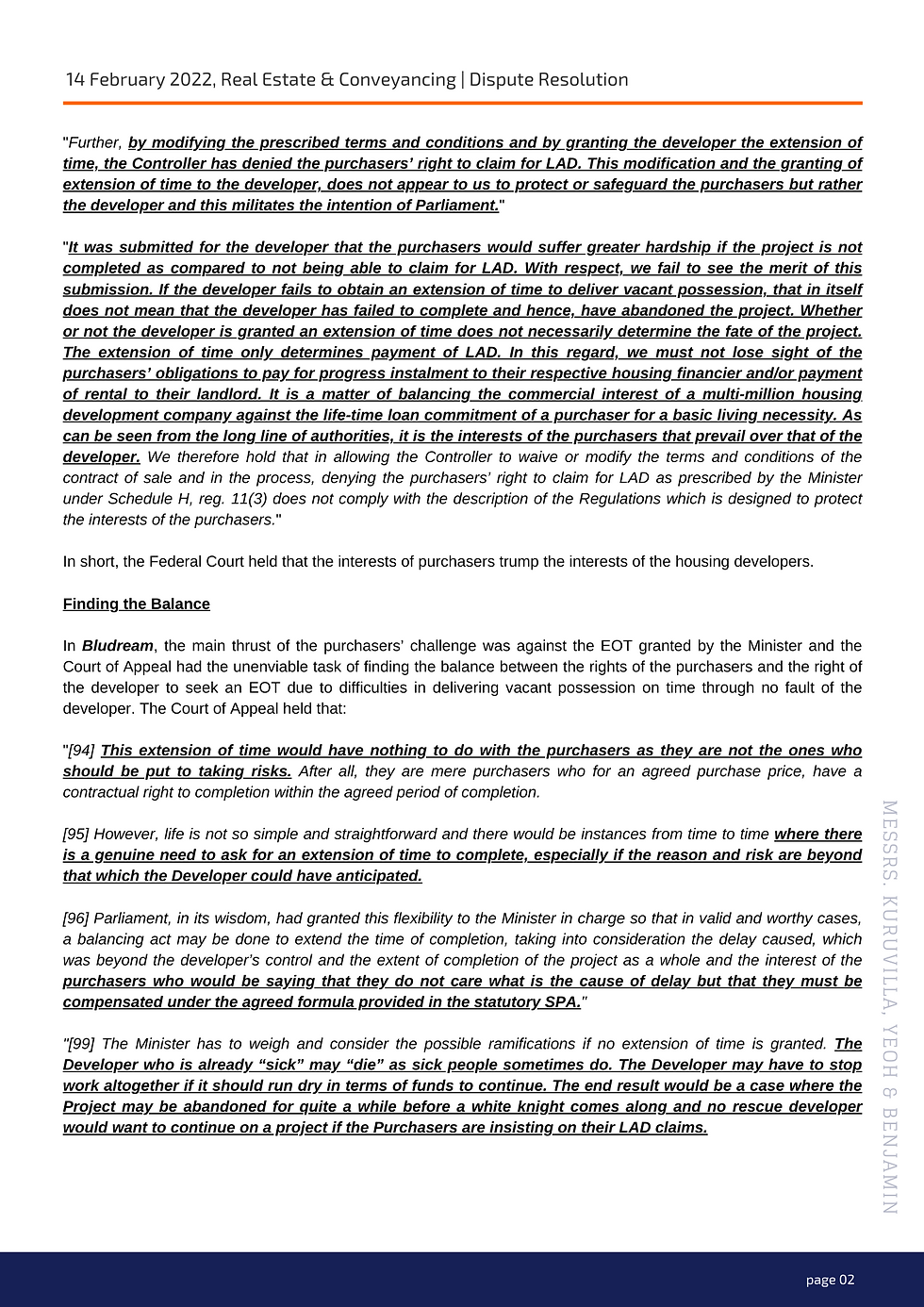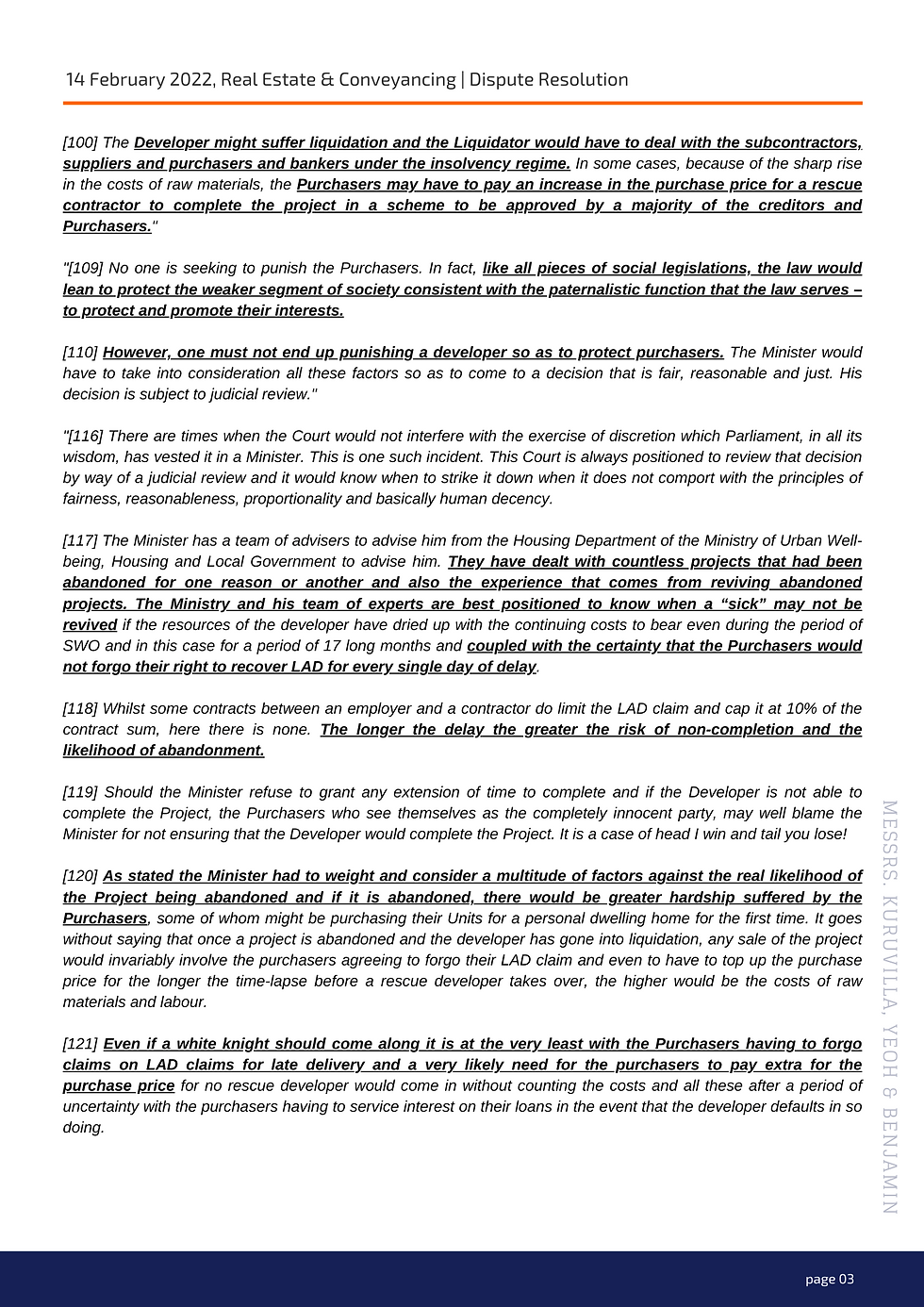Finding A Balance - Policy Considerations In The Courtroom
- Kuruvilla, Yeoh & Benjamin
- Feb 14, 2022
- 8 min read
Updated: Mar 20, 2022
Background
Statutorily prescribed sale and purchase agreements under the Housing Development (Control and Licensing) Act 1966 provide certainty to purchasers as to the timeline for the delivery of vacant possession by housing developers and the right to claim for liquidated ascertained damages ("LAD") in the event of a late delivery.
In cases where housing developers are granted an extension of time ("EOT") for the delivery of vacant possession, there have been instances where purchasers have felt that they have been exploited as this would invariably deny purchasers from claiming LAD.
As such, challenges have been mounted by purchasers against EOT(s) culminating in the Federal Court’s decision in Ang Ming Lee & Ors v Menteri Kesejahteraan Bandar, Perumahan dan Kerajaan Tempatan & Anor and other appeals [2020] 1 MLJ 281 where the Federal Court appeared to have shifted the balance in favour of purchasers.
The recent Court of Appeal decision in Bludream City Development Sdn Bhd v Kong Thye & 184 others and 5 other appeals considered similar legal issues but the balance appeared to swing the other way, this time in favour of housing developers.
Federal Court's Approach in Ang Ming Lee
Whilst the issue of EOT in Ang Ming Lee was ultimately decided on the basis that the EOT was granted by the Controller of Housing ("Controller") and therefore invalid, several excerpts of the judgment by the Federal Court remain relevant as a matter of principle. The Federal Court stated:
"The Act being a social legislation designed to protect the house buyers, the interests of the purchasers shall be the paramount consideration against the developer. Parliament has entrusted the Minister to safeguard the interests of the purchasers and the Minister has prescribed the terms and conditions of the contract of sale as per Schedule H. We find no contrary indication in the language, scope or object of the Act that such duty to safeguard the interests of the purchasers may be delegated to some other authority the Schedule H contract of sale prescribed by the Regulations is to carry into effect the provisions of the Act, which is to protect the interests of the purchasers. The regulations made by the Minister must thus achieve the object of protecting the interests of the purchasers and not the interests of the developers. And at the risk of repetition, the duty to protect the interests of the purchasers is entrusted to the Minister."
"Further, by modifying the prescribed terms and conditions and by granting the developer the extension of time, the Controller has denied the purchasers’ right to claim for LAD. This modification and the granting of extension of time to the developer, does not appear to us to protect or safeguard the purchasers but rather the developer and this militates the intention of Parliament."
"It was submitted for the developer that the purchasers would suffer greater hardship if the project is not completed as compared to not being able to claim for LAD. With respect, we fail to see the merit of this submission. If the developer fails to obtain an extension of time to deliver vacant possession, that in itself does not mean that the developer has failed to complete and hence, have abandoned the project. Whether or not the developer is granted an extension of time does not necessarily determine the fate of the project. The extension of time only determines payment of LAD. In this regard, we must not lose sight of the purchasers’ obligations to pay for progress instalment to their respective housing financier and/or payment of rental to their landlord. It is a matter of balancing the commercial interest of a multi-million housing development company against the life-time loan commitment of a purchaser for a basic living necessity. As can be seen from the long line of authorities, it is the interests of the purchasers that prevail over that of the developer. We therefore hold that in allowing the Controller to waive or modify the terms and conditions of the contract of sale and in the process, denying the purchasers’ right to claim for LAD as prescribed by the Minister under Schedule H, reg. 11(3) does not comply with the description of the Regulations which is designed to protect the interests of the purchasers."
In short, the Federal Court held that the interests of purchasers trump the interests of the housing developers.
Finding the Balance
In Bludream, the main thrust of the purchasers’ challenge was against the EOT granted by the Minister and the Court of Appeal had the unenviable task of finding the balance between the rights of the purchasers and the right of the developer to seek an EOT due to difficulties in delivering vacant possession on time through no fault of the developer. The Court of Appeal held that:
"[94] This extension of time would have nothing to do with the purchasers as they are not the ones who should be put to taking risks. After all, they are mere purchasers who for an agreed purchase price, have a contractual right to completion within the agreed period of completion.
[95] However, life is not so simple and straightforward and there would be instances from time to time where there is a genuine need to ask for an extension of time to complete, especially if the reason and risk are beyond that which the Developer could have anticipated.
[96] Parliament, in its wisdom, had granted this flexibility to the Minister in charge so that in valid and worthy cases, a balancing act may be done to extend the time of completion, taking into consideration the delay caused, which was beyond the developer’s control and the extent of completion of the project as a whole and the interest of the purchasers who would be saying that they do not care what is the cause of delay but that they must be compensated under the agreed formula provided in the statutory SPA."
"[99] The Minister has to weigh and consider the possible ramifications if no extension of time is granted. The Developer who is already “sick” may “die” as sick people sometimes do. The Developer may have to stop work altogether if it should run dry in terms of funds to continue. The end result would be a case where the Project may be abandoned for quite a while before a white knight comes along and no rescue developer would want to continue on a project if the Purchasers are insisting on their LAD claims.
[100] The Developer might suffer liquidation and the Liquidator would have to deal with the subcontractors, suppliers and purchasers and bankers under the insolvency regime. In some cases, because of the sharp rise in the costs of raw materials, the Purchasers may have to pay an increase in the purchase price for a rescue contractor to complete the project in a scheme to be approved by a majority of the creditors and Purchasers."
"[109] No one is seeking to punish the Purchasers. In fact, like all pieces of social legislations, the law would lean to protect the weaker segment of society consistent with the paternalistic function that the law serves – to protect and promote their interests.
[110] However, one must not end up punishing a developer so as to protect purchasers. The Minister would have to take into consideration all these factors so as to come to a decision that is fair, reasonable and just. His decision is subject to judicial review."
"[116] There are times when the Court would not interfere with the exercise of discretion which Parliament, in all its wisdom, has vested it in a Minister. This is one such incident. This Court is always positioned to review that decision by way of a judicial review and it would know when to strike it down when it does not comport with the principles of fairness, reasonableness, proportionality and basically human decency.
[117] The Minister has a team of advisers to advise him from the Housing Department of the Ministry of Urban Well-being, Housing and Local Government to advise him. They have dealt with countless projects that had been abandoned for one reason or another and also the experience that comes from reviving abandoned projects. The Ministry and his team of experts are best positioned to know when a “sick” may not be revived if the resources of the developer have dried up with the continuing costs to bear even during the period of SWO and in this case for a period of 17 long months and coupled with the certainty that the Purchasers would not forgo their right to recover LAD for every single day of delay.
[118] Whilst some contracts between an employer and a contractor do limit the LAD claim and cap it at 10% of the contract sum, here there is none. The longer the delay the greater the risk of non-completion and the likelihood of abandonment.
[119] Should the Minister refuse to grant any extension of time to complete and if the Developer is not able to complete the Project, the Purchasers who see themselves as the completely innocent party, may well blame the Minister for not ensuring that the Developer would complete the Project. It is a case of head I win and tail you lose!
[120] As stated the Minister had to weight and consider a multitude of factors against the real likelihood of the Project being abandoned and if it is abandoned, there would be greater hardship suffered by the Purchasers, some of whom might be purchasing their Units for a personal dwelling home for the first time. It goes without saying that once a project is abandoned and the developer has gone into liquidation, any sale of the project would invariably involve the purchasers agreeing to forgo their LAD claim and even to have to top up the purchase price for the longer the time-lapse before a rescue developer takes over, the higher would be the costs of raw materials and labour.
[121] Even if a white knight should come along it is at the very least with the Purchasers having to forgo claims on LAD claims for late delivery and a very likely need for the purchasers to pay extra for the purchase price for no rescue developer would come in without counting the costs and all these after a period of uncertainty with the purchasers having to service interest on their loans in the event that the developer defaults in so doing.
[122] There is also a real likelihood that the Developer might not be able to continue to service the interests on the housing loans released in which case the Banks may have to look to their contracting parties in the Purchasers/Borrowers to foot the interests. See the case of Ambank (M) Berhad (Formerly Known As AmFinance Berhad) v Tan Yu Hock [2012] MLJU 639.
[123] What is important is that the Minister in arriving at his decision must not be actuated by bad faith or motivated by irrelevant considerations. It must be arrived at fairly taking into consideration the hardship suffered by the Developer because of the 17 months of inability to work on the Project that would cause any developer to bleed because costs of bank loans in the bridging loans and other overheads will continue to run and assuming the Project is completed after the lifting of the SWO, another round of claims by the Purchasers that would be enough to cause any developer to go down under."
Takeaways
The circumstances of Bludream appear to be straightforward because the developer was found not to be at fault for the delay. However, this may not be the case for other housing developments.
How heavily would policy considerations weigh on the Court whilst it perseveres to strike the right balance in more complex scenarios and in particular where the developer bears some responsibility for the delay? The reality for many developers, especially special purpose vehicles, is that there will be a real prospect of going into liquidation if no EOT is granted, therefore making LAD payable.
Whilst the Court of Appeal’s decision in Bludream is indeed welcome development on the facts of the case, we take the view that it should not be the case that “protecting the developers in order to protect the purchasers” becomes the overriding policy consideration.
This article is authored by Edward Kuruvilla, Alden Yeoh Shuen Chun and Benjamin Chia Lin Fung, the founders and partners of Messrs. Kuruvilla, Yeoh & Benjamin.
Edward Kuruvilla leads the Dispute Resolution practice group, Alden Yeoh leads the Corporate & Commercial practice group whereas Benjamin Chia leads Projects & Real Estate practice group.
For more information, please visit www.kyblegal.com or please feel free to contact Edward Kuruvilla at edward@kyblegal.com, Alden Yeoh at alden@kyblegal.com and/or Benjamin Chia at benjamin@kyblegal.com.
To download the article, please click on the link below.






Comments